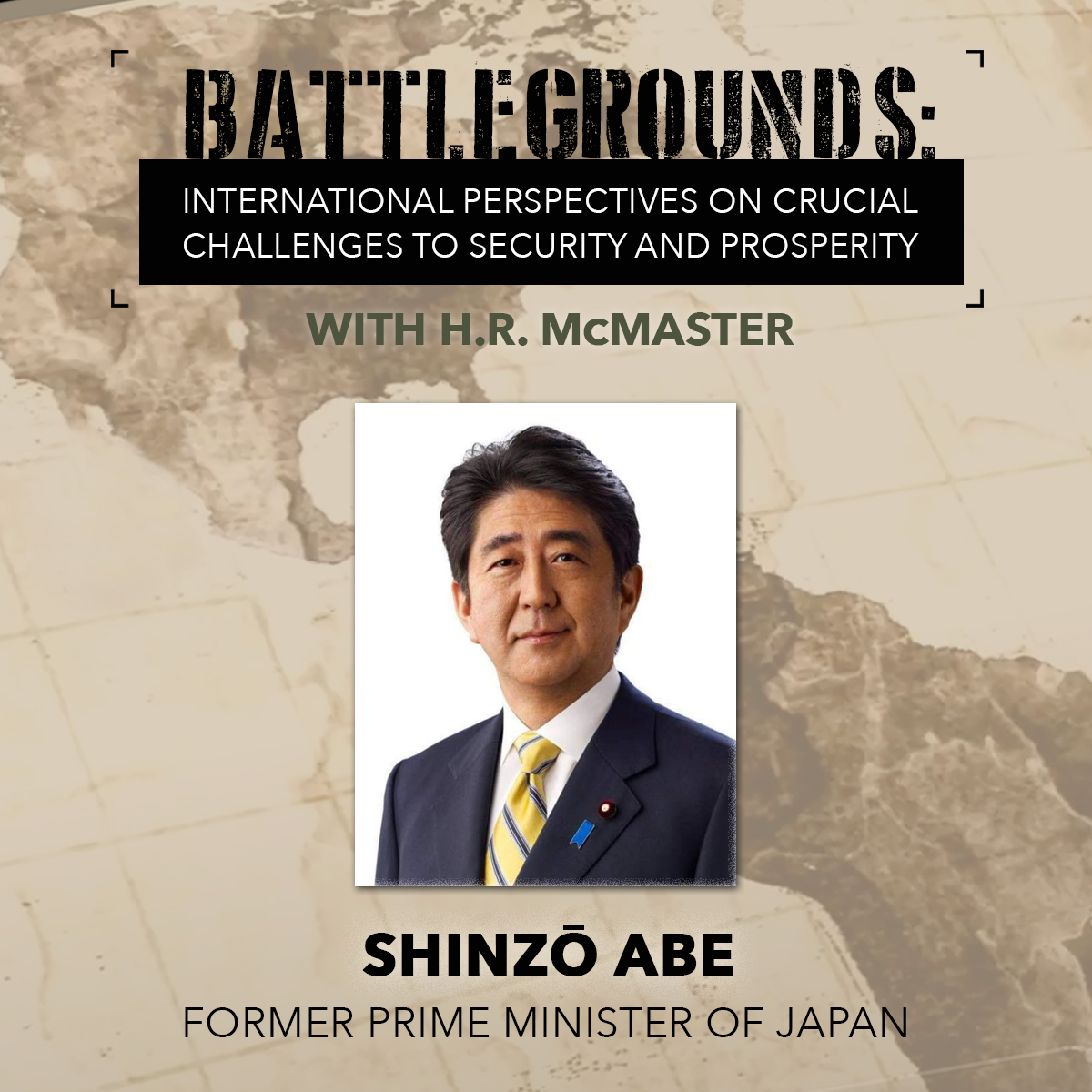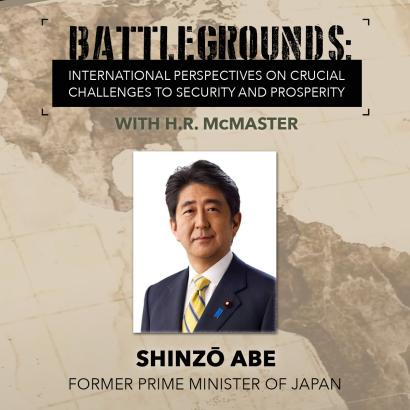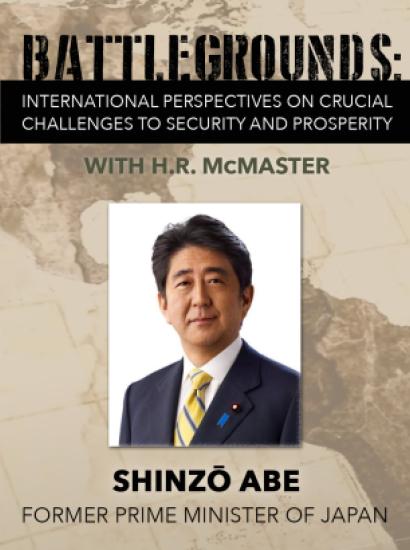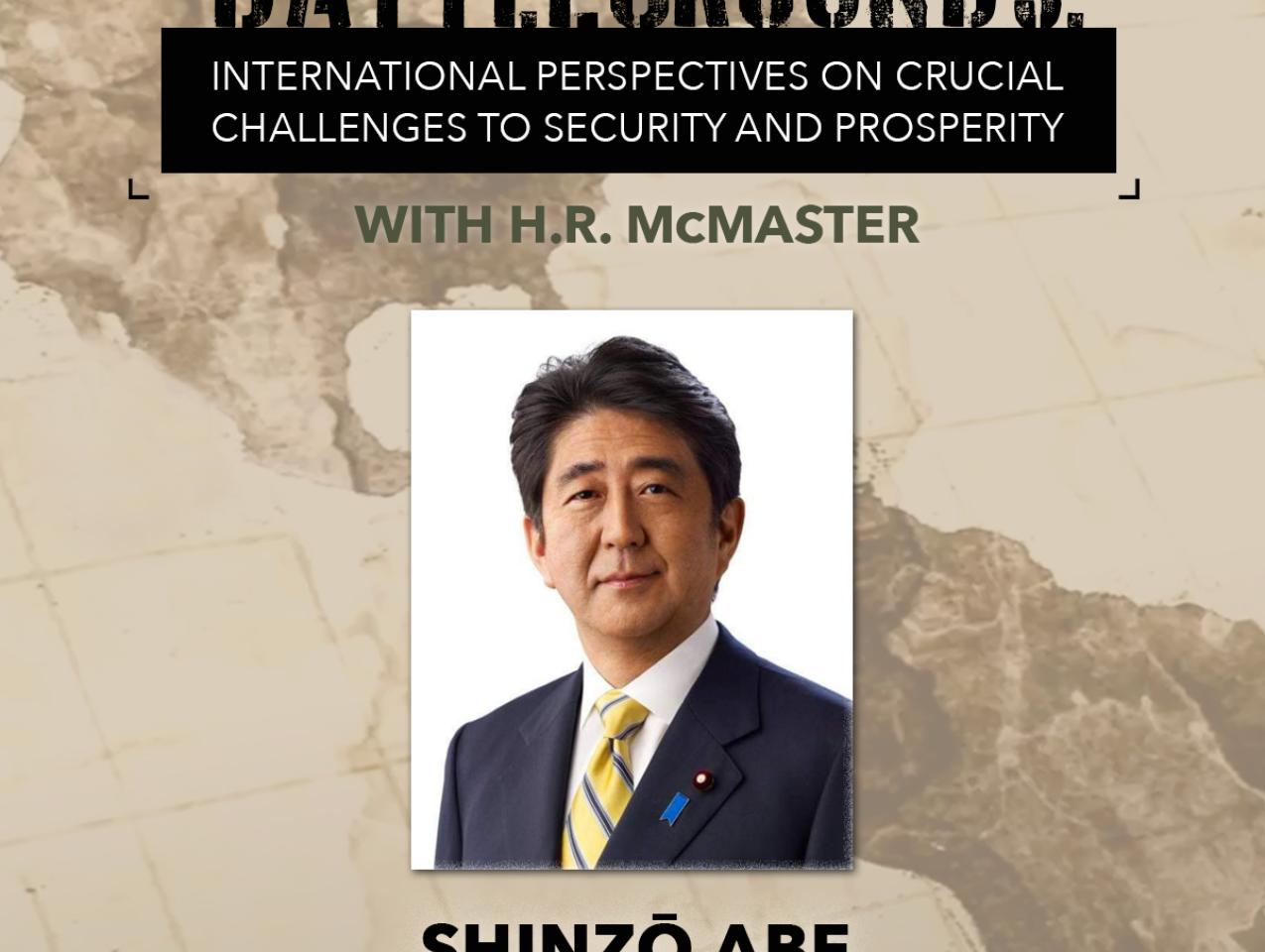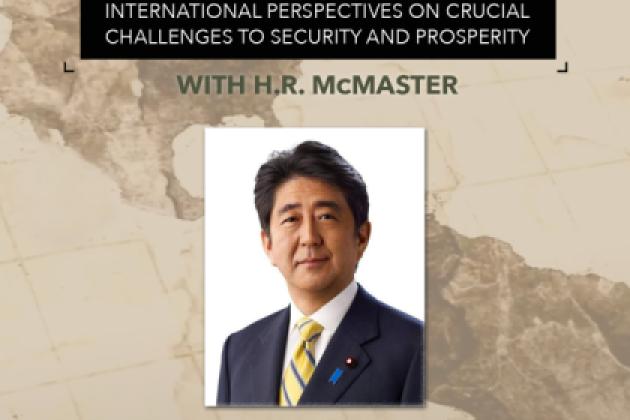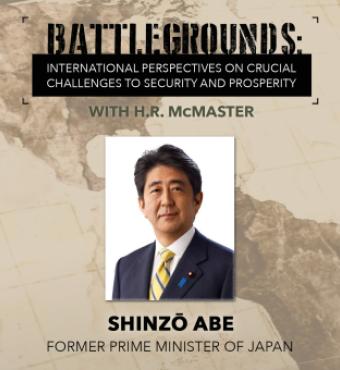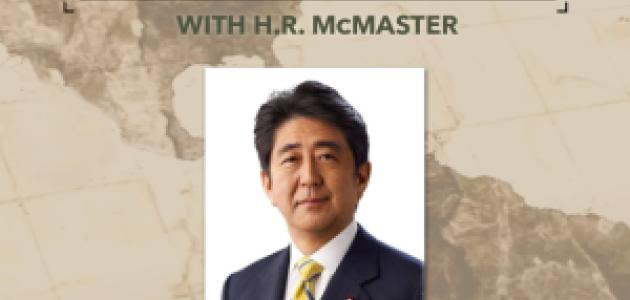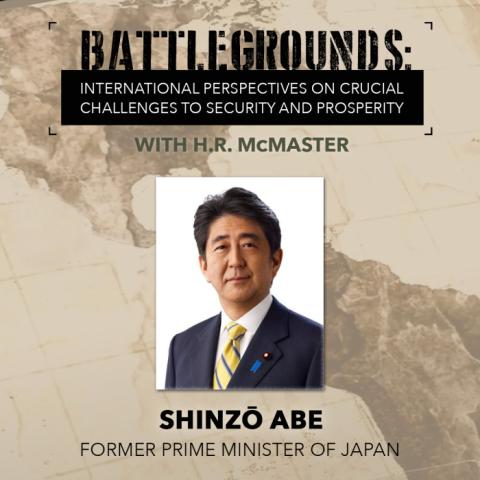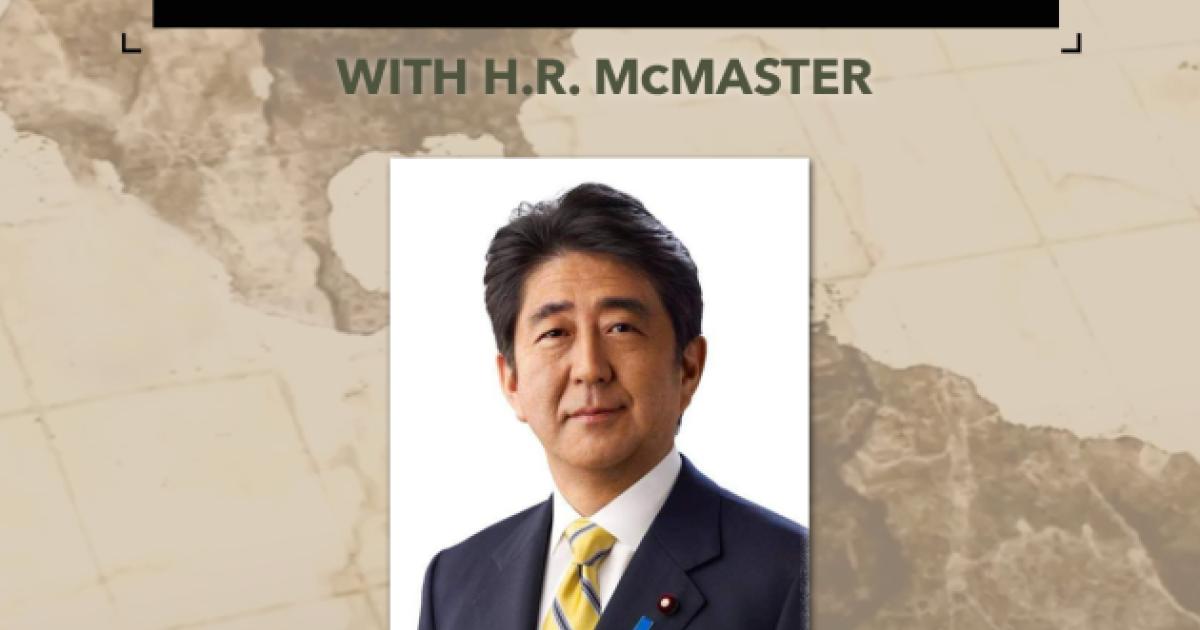- Security & Defense
- US Defense
- International Affairs
- US Foreign Policy
- History
- Economic
- Military
- Contemporary
- US
- World
- Law & Policy
- Civil Rights & Race
In this episode of Battlegrounds, H.R. McMaster and former Prime Minister Shinzō Abe reflect on his service as prime minister, shared security challenges, and the vision of a free and open Indo-Pacific.
H.R. McMaster in conversation with Shinzō Abe on Wednesday, July 21 at 9:00am PT.
For full coverage of the Battlegrounds event, click here.
WATCH THE LIVESTREAM
ABOUT THE SPEAKERS
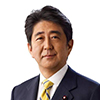
Mr. Shinzo Abe is the former Prime Minister of Japan and has been a member of Japanese Diet, Japan’s national legislature, since 1993. He served as Prime Minister of Japan from 2006-2007 and 2012-2020.
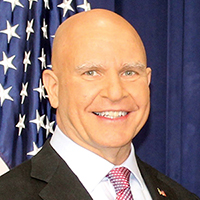
H. R. McMaster is the Fouad and Michelle Ajami Senior Fellow at the Hoover Institution, Stanford University and the Japan Chair at the Hudson Institute. He is also the Bernard and Susan Liautaud Fellow at the Freeman Spogli Institute and lecturer at Stanford University’s Graduate School of Business. He was the 25th assistant to the president for National Security Affairs. Upon graduation from the United States Military Academy in 1984, McMaster served as a commissioned officer in the United States Army for thirty-four years before retiring as a Lieutenant General in June 2018.
To view the transcript of this episode, please read below:
H. R. McMaster: America and other free and open societies face crucial challenges and opportunities abroad that affect security and prosperity at home. This is a series of conversations with guests who bring deep understanding of today’s battlegrounds and creative ideas about how to compete, overcome challenges, capitalize on opportunities, and secure a better future. I am H. R. McMaster. This is Battlegrounds.
Speaker 1: On today’s episode of Battlegrounds, our guest is Mr. Shinzō Abe, former prime minister of Japan. Mr. Abe has been a member of the Japanese Diet, Japan’s national legislature, since 1993. Mr. Abe was Japan’s longest-sitting prime minister, serving from 2006 to 2007 and 2012 to 2020. Prime Minister Abe left a lasting legacy in the history of Japan. Upon his return to prime ministership, he advanced an optimistic vision to help bring Japan out of economic and political darkness following the 2011 Great East Japan Earthquake. His trademark economic policies, dubbed Abenomics, and his proactive diplomacy expanded Japan’s global influence. Prime Minister Abe’s foreign and defense policies aimed to make a proactive contribution to peace. He established the National Security Secretariat, equivalent of the US National Security Council, in 2013; released the first-ever national security strategy in that same year; and enacted the legislation for peace and security in 2016. He steered the reinterpretation of Japan’s constitution to expand the situations under which Japan can exercise collective self-defense. Under the Obama administration, Prime Minister Abe hosted President Barack Obama’s visit to Hiroshima and conducted his own visit to Pearl Harbor. He was the first Japanese leader to address a joint meeting of US Congress, where he described the unwavering Japan–US Alliance as an alliance of hope. Prime Minister Abe maintained a close rapport with three US presidents, but his golf diplomacy with President Donald Trump, from Mar-a-Lago to Bedminster to Tokyo, received the most attention from the international press. Prime Minister Abe was the first world leader to elaborate the vision of a Free and Open Indo-Pacific. He promoted cooperation among the Quad of Japan, the United States, Australia, and India, to address emerging challenges in the region. Prime Minister Abe promoted international agreements to improve security and prosperity. His government was a key player in the 2016 signing of the Trans-Pacific Partnership and the establishment of the Data Free Flow with Trust initiative in 2019. Prime Minister Abe fostered cooperation among world leaders, including at the 2016 G7 Ise-Shima Summit and as chair of the 2019 G20 Osaka Summit. Throughout his tenure, Prime Minister Abe confronted numerous foreign policy challenges, including North Korea’s nuclear and missile programs and North Korean abductions of Japanese citizens, territorial disputes and the pursuit of a peace treaty with Russia, tensions with the Republic of Korea, and an increasingly aggressive Chinese Communist Party. His leadership raised Japan’s profile on the international stage. He oversaw Tokyo’s successful bid to host the 2020 Olympic and Paralympic games at the 2013 IOC session in Buenos Aires, and appeared in the closing ceremony of the Rio Olympic games in 2016, where he popped out of a pipe dressed as Super Mario. We welcome Prime Minister Abe to reflect on his legacy as prime minister, hear his perspective on shared security challenges, and contemplate the future for free and open societies in the Indo-Pacific and beyond.
H. R. McMaster: Prime Minister Abe, welcome to Battlegrounds. It is an honor to host you. Working with you and your talented team was a highlight of my time as national security advisor. And it’s wonderful to see you again.
Shinzō Abe: Well, General McMaster, it’s been quite long since we last saw each other, and it is a tremendous honor and pleasure for me to have this conversation with you today. Today, I certainly look forward to having a discussion with you featuring the security environment at this moment, as well as the ways to strengthen [the] Japan–US Alliance.
H. R. McMaster: Thank you, prime minister, and thank you especially for your leadership and your vision at a critical time. I thought we might as well begin with what was one of our top priorities anyway, in our work to promote security and prosperity for both our countries and across the world.
H. R. McMaster: I remember, finally, my first meeting with your national security advisor Yachi Shotaro, and the issue of course at the top of our agenda then, which was how to address the challenge from China and the Chinese Communist Party, seems today to be the priority really across the whole free world. So I thought I might just begin by asking you about the security threat from China, an expanding military that is continuing provocations against Taiwan, Japan’s Senkaku Islands, the South China Sea, India’s Himalayan frontier, and really across the whole Indo-Pacific.
H. R. McMaster: So, I know our audience would love to hear your view of the military threats from China. And then how does Japan plan to address those threats?
Shinzō Abe: Well, speaking of the location of Japan, Japan is located just next to China with the thin strip of water next to each other. So among all the G7 nations, we are at the forefront when it comes to the impact and influence of China, particularly in the context of security and military affairs.
Shinzō Abe: Well, speaking of the history of Japan, especially in the context of security affairs, when we had the former USSR, the fighters that were coming to USSR were the ones who intruded into the Japanese ADIZ [Air Defense Identification Zone]. Of course, at this moment, we still see Russian fighters intruding into the ADIZ, but mainly we are dealing with the flights of the Chinese fighters entering the Japanese ADIZ. And against such a backdrop, the Japanese self-defense forces are now addressing this situation by having a series of scrambles.
Shinzō Abe: In the last 30 years, China has been rising militarily, and also very significantly. Their military spending got increased by 42 times in the last 30 years. And as of now, their spending is almost four times as large as Japanese defense spending. So when you look at these numbers, you can have the firsthand understanding about the Chinese intention and will. And how with this ill will and determination, China has been continuing its unilateral attempts to change the status quo in South China Sea, in East China Sea and elsewhere in the world.
Shinzō Abe: And then I returned to the post and role of the prime minister in Japan at the end of 2012, and starting in the year 2013, I decided to materialize our unwavering determination to enhance Japan’s own defense capability. Before I came back as prime minister, Japan had been cutting its defense spending for 10 consecutive years. But since I came back, we successfully increased the national defense spending every year.
Shinzō Abe: And also as part of my administration’s initiative, Japan decided to deploy a total of 147 F-35 jets, and this process has already begun. And also, my administration had decided to deploy standoff missiles as part of Japan’s defense effort. And starting 2021 fiscal year, we also started to develop our own long-range standoff missile that could be fired from underground. So along that line, we have been making every effort to enhance Japan’s own defense capability.
Shinzō Abe: When we look back at the history, we saw many instances and cases where one side had misunderstanding and underestimated the will and capability of the other side, and that eventually led to confrontation or disputes. So in that context, I do believe that it remains very important for us to make China realize Japan’s determination and also have correct understanding about Japan’s capability. And that will remain the key.
Shinzō Abe: When I was a prime minister, in my direct conversation with President Xi of China, I specifically told him never to underestimate Japan’s unwavering determination as to our right over the Senkaku Islands.
Shinzō Abe: And also as to the Taiwan Strait, at the most recent Japan–US Summit meeting, both leaders specifically underscored the importance of peace and stability across the Taiwan Strait in their joint statement. And also the outcome of the G7 Summit in Cornwall, the G7 leaders also specifically underscored this point. And I do believe that these developments are extremely important. By doing this effort, we successfully demonstrated Japan’s unwavering will but also the unwavering determination of the alliance between Japan and the United States, together with the firm will of the G7 leaders as a whole. So we successfully sent out a very robust message to China.
Shinzō Abe: And some might say that the actions that we have been taking are challenging China, but that is not the case. By doing this, we are sending a robust message to China and also demonstrating our will and our capability of the alliance, as well as the individual nation-state. And also moving forward, I do think that sending out such a message to China will encourage China to realize that it will be unproductive and it will not serve their interest if China sticks to its policy of constantly extending militarily. And I do think that through our message, we’re now showing China which way that they should take, and also which direction that they should aim for, in the role of security. By doing that, we’ll be able to avoid China’s miscalculation or misunderstanding, and through that, we’ll be able to avoid any confrontation with China. So this messaging will be the key for us as we move forward.
H. R. McMaster: Prime minister, I agree with you that really the key is to deter conflict with China, and that can only be done through strength. And I think, of course, and I know that you believe, that the Japan–US Alliance is critical to demonstrating that strength. I often mention the speech that you gave in front of the Joint Session of Congress that was very eloquent in connection with the importance of the alliance and the miracle of the alliance.
H. R. McMaster: And you made every effort to strengthen the alliance militarily, you mentioned some of the measures. You also included, and worked on, the reinterpretation of the constitution, which would enable Japan—is enabling Japan—to exercise the right to collect a self-defense and in certain situations and in an environment of growing threats. And I just wondered if you could share with our viewers what your top priorities are for strengthening Japan–US cooperation, including in the security area, maybe especially in the area of security.
Shinzō Abe: Against the backdrop of the military rise of China, I elaborated my views on the need to establish a robust defense posture. In the year 2012, I came back as a prime minister, and [the] next year, in 2013, my administration decided to establish a National Security Secretariat, and also we, for the first time in the history of Japan, released the Japanese National Security Strategy.
Shinzō Abe: General, you just mentioned my address to a Joint Section of US Congress. And as you may recall, as part of my address, I highlighted the contribution and sacrifice made by the US forces, especially under the Operation Tomodachi in the aftermath of the Great East Japan Earthquake. Thanks to this operation, the United States has saved so many lives of Japanese people. And in that address, I told the audience that I still vividly recall every contribution made by the US side.
Shinzō Abe: And in view of potential contingency in the region, my determination was to transform our alliance into something under which both Japan and the United States can help each other. And I do believe that by ensuring that the two sides can help with each other, we’ll have more [a] robust bond under the alliance. Under such thinking, in the year 2014, I and my administration decided to change the interpretation of the constitution. Prior to that, we had the interpretation that would not allow the exercise of collective self-defense, right? But I changed the interpretation and based on that, my administration developed and enacted legislation for peace and security.
Shinzō Abe: Thanks to the enactment of the legislation for peace and security, Japanese self-defense forces are now doing their operation for the asset protection of the US military assets in the surrounding environment of Japan. Both the Japanese airplanes—fighter jetsand missiles are now protecting American military assets. And also in terms of the number of Japan–US joint training and exercises, 20 years ago we only had 20 times per year, but in the year 2020, the total number has become 49. So the entire number got more than doubled, and that is a testament to what the legislation for peace and security brought for our alliance. And I do think that our alliance has become much closer in practical sense under this new legislation.
Shinzō Abe: In the summit meeting between Prime Minister Suga and President Biden, [the] president specifically highlighted American commitment to the defense of Japan, including the application of Article 5 of Japan–US Security Treaty to the Senkaku Islands, and I highly value such outcome of the summit meeting. On top of that, the two leaders decided to accelerate bilateral consultation and deliberation to enhance the alliance’s deterrence, as well as response capabilities in the new domains, including outer space, cyberspace, as well as electromagnetic ways. I think the key for both sides will [be] how we can achieve concrete outcomes through such a steady consultation across all domains.
Shinzō Abe: Also, our alliance and our bilateral corporation is not all about security affairs. On top of our security cooperation, we are taking a number of initiatives in various areas, including our collaboration in our effort to realize a Free and Open Indo-Pacific, our bilateral cooperation in enhancing our competitive edge, and also promoting innovation in the realm of digital affairs, as well as science and technology. We do also continue our collaboration in the imminent challenges that we are facing, such as the corona[virus] response and global health. Also climate change is another big issue that we have been working, the implementation of the Paris Accord, as well as the development and application of clean technology, as well as decarbonization.
Shinzō Abe: So the green growth will be another area that we have been working, and the entire world is actually counting on us, Japan and the United States, to bring tangible outcomes through these initiatives. If we are to successfully materialize our collaboration in these of the various areas, I do think that we’ll be able to further deepen our alliance.
H. R. McMaster: Prime Minister, I think this is a really important point, is that the competition with China involves, obviously, an economic dimension as well. But part of that is for us to maintain our competitive advantages, working together to develop and apply emerging and important technologies, efforts to make supply chains more resilient. COVID-19 highlighted the urgent importance of that. I know that you’ve recently taken on some additional responsibilities in Parliament on supply-chain resiliency, especially in connection with semiconductors, and then also, as you mentioned, aspects of energy security and how that relates to climate change. So could you share with our viewers what more we have to do, the United States, Japan, to maintain our competitive advantages in technology and from an economic perspective?
Shinzō Abe: Well, this year, due to the insufficient supply of the semiconductors worldwide, we have experienced the hold of the production of autos. That actually made us recognize that semiconductors are the indispensable foundation for any industry that we have at this moment. We all recognize the importance of how we can make our supply chains more resilient.
Shinzō Abe: Emerging technologies, including semiconductors, batteries, and rare earth have direct implications [on] a nation’s national security. That’s why Japan also decided to promote our interest in this area under a nation’s strategy. Speaking of my own party, LDP [Liberal Democratic Party] also decided how to make every effort on this front. I myself have been serving as a flag-bearer to promote our economic security interest. Speaking of China’s response, they have been trying everything that they can [to] enhance their industries under its own state capitalism. But we, as like-minded nations, also do everything we can to protect and promote our own industries.
Shinzō Abe: When you think about the involvement and encouragement from the national government, you tend to focus on the aspect of protection of the state-of-the-art technologies, such as the export control. But having said that, another aspect that we have to pay attention [to] is the promotion. We have to do everything we can to assist research and development, as well as support our supply chains. In the role of economic security, of course, protection is important.
Shinzō Abe: But what I’d like to underscore here is that we have to have make these two requirements, protection and promotion, to be realized in this area. The most important mission that we have to achieve is to ensure that countries sharing fundamental values, such as freedom, democracy, basic human rights, the rule of law and fairness, continue its collaboration and move forward in a concerted manner. As I said earlier, at the most recent Japan–US summit meeting, both sides decided to continue deliberation on the bilateral cooperation in economic security role, but we also need to do everything we can to bring together the wisdom and strength of the like-minded nations in global scale. I think this could be characterized as an effort to set up a tech alliance among the like-minded nations, and I think this will be another initiative that we have to seek.
H. R. McMaster: I agree. I think this is a great idea. What some people are calling a D-10 or a T-10 of democratic countries. Prime Minister, you were a big promoter of the vision of a Free and Open Indo-Pacific, and this was aimed at strengthening us economically and from a security perspective, but really from a perspective of principles and values as well. I think that the promotion of democratic governance and basic human rights and rule of law and freedom of speech, these aren’t just an exercise in an altruism, that promotion, it’s also one of the best means to counter the Chinese Communist Party vision, which is quite different and aimed at, I think, creating servile relationships with countries through programs like the Belt and Road Initiative and the debt trap that they set for countries. As you look now at this very strong legacy that you’ve left with the Free and Open Indo-Pacific, what else do you think we have to do to realize your vision? We talked about technology and security and economic competition, but would you mind commenting a little bit on what more we can do to promote the free and open vision as an alternative to China’s authoritarian mercantilist model?
Shinzō Abe: Surrounding Japan, there’s vast oceans, the Indian Ocean as well as the Pacific Ocean. In order for us to transform these two vast oceans into an international public good, which would serve for prosperity, [for] not only the region but also the entire world, it will be critically important to maintain free and open order based on the rule of law. In order for us to realize such order that is free and open, there has to be something that would underpin such an order, and that is the compliance of the international law by all nation-states. My vision was to ensure all like-minded nations come together by sharing fundamental values and also sharing determination to maintain and protect such free and open order. That was the thinking that I had when I elaborated my vision of a Free and Open Indo-Pacific. Back in August 2007, I had an honor to give an address to the Indian Parliament, where I had delivered my speech, titled “Confluence of the Two Seas.” I elaborated my vision on that occasion in highlighting the new concept of this geopolitical idea of Indo-Pacific as one word. The FOIP [Free and Open Indo-Pacific] concept is something that I came to elaborate and further develop based on the thinking that I laid out in India. Under the vision of a Free and Open Indo-Pacific, I set three main pillars. First was to the promotion of the fundamental values, including the freedom of navigation, as well as the rule of law. Second was the economic prosperity through the infrastructure development, as well as ensuring connectivity in the region. The final pillar was the collaboration to realize peace and stability through capacity-building effort for the maritime law enforcement and other aspects. My vision was the one which drove Japan to work [with] other like-minded nations to seek concrete collaboration along with these three main pillars. President Biden now also endorses this thinking of FOIP and our collaboration. As of now, Japan and the United States are working together as valued partners, and I am very happy to see such close collaboration between the two sides. Our vision of a Free and Open Indo-Pacific is an open one and also an inclusive effort, under which we would welcome any nations that share the fundamental thinking and our shared vision. So, moving forward, the key will be how we can effectively bring more nations and partners on board in this process of realizing a Free and Open Indo-Pacific, and also how we can continue every effort to materialize specific and concrete collaboration and cooperation.
H. R. McMaster: I think this is a really important point for our viewers. These aren’t just words. I mean, I’ve seen the actions, right? That have occurred in the format of the Free and Open Indo-Pacific. Freedom of navigation exercises through the South China Sea, that are now done routinely at a multinational level. The leadership that Japan has taken in establishing standards for infrastructure investment across the region, the actions that Japan has led in the World Trade Organization is another example, I think. So I just want to make sure our viewers know that there’s been a tremendous amount of progress. And one of the areas that was an early part of your vision, I think right after you gave that speech, I think, in India in 2007, you were an advocate of the Quad format, Quad sort of anchoring the Free and Open Indo-Pacific from India to Australia to Japan to the United States. And the first ever Quad summit meeting was held earlier this year. I hope that you were proud of that, because I think you really are the one who started the momentum behind that. And I’d just like to ask for your assessment of the Quad and what your vision is for the Quad going forward.
Shinzō Abe: Well, even when I first served as prime minister, I focused on this need for us to materialize Quad cooperation. And behind this was my thinking about India. India was back then also a large nation population-wise, compared to China, and also it is a huge democracy in Asia and also I could see great potential for growth of this country. So that is why I had been focusing on India.
Shinzō Abe: So back then, I laid out my vision about Quad to President Bush of the United States, Prime Minister Howard of Australia, as well as Prime Minister Manmohan Singh of India. And they all shared my view. But back then the balance of China, especially in the military and security role, was not as conspicuous as we see at this moment. And free nations did not share the imminent and urgent need for us to materialize such cooperation under the Quad framework. So back then, we only had director-general-level consultation under the Quad concept and we did not have any ministerial or summit level cooperation. And then when I came back as prime minister again, I started to work on the realization of Quad among the four like-minded nations. And behind us was a greater assertiveness shown by China in its unilateral attempts to change the status quo. In the year 2016 on the occasion of the TICAD meeting, Tokyo International Conference on African Development, I have explained Japan’s Free and Open Indo-Pacific vision. Fortunately, President Trump back then bought my argument and he endorsed this vision, and same as Australia and India. They are very positive about this Quad cooperation. Speaking of the United States, from President Trump to President Biden, they maintained this policy and emphasis on the FOIP. And also in Australia, starting from Prime Minister Abbott to Prime Minister Turnbull and Prime Minister Morrison, they also share the importance of this initiative so as to ensure our regional stability. Same as in India, Prime Minister Modi has been quite effective in following through his determination to maintain this Quad cooperation. And then in September 2019, there was the first-ever foreign ministers’ Quad meeting on the margins of the UN General Assembly followed by the first-ever summit, Quad summit meeting, in March this year. So I’m very happy to see this steady progress in our Quad cooperation. As an outcome of the first-ever Quad summit meeting back in March, the leaders decided to promote cooperation in new domains, including supply of vaccines, ensuring and protecting critical and emerging technologies, as well as climate change. And they decided to set up three separate working groups to promote cooperation on top of the traditional cooperation that we have been continuing in areas such as quality infrastructure, as well as maritime security. So, moving forward, I do think that the key for [the] four of us will be to materialize practical and concrete cooperation under the Quad.
H. R. McMaster: One of those areas of cooperation was another area where you, I think, pioneered years ago, and that this is what is now being called the Data Free Flow with Trust, or DFFT. And this is one of these new arenas of competition. Whoever makes the rules on data is going to have a competitive advantage. And of course, China is trying to bend those rules in favor of its authoritarian model. So I wondered, would you mind sharing your thoughts on that initiative in particular? But then also, what more can be done in the areas of trade agreements? I know that you were in—this was a conversation many times with us, with President Trump on the Trans-Pacific Partnership. You know the difficulties in passing any multilateral trade agreement in the United States, regardless of which political party’s in charge. But what is your vision for the future on initiatives like the Data Free Flow with Trust and trade agreements? What else do you think we have to do internationally to convince China that our system works and that China can benefit most by participating in that system rather than trying to subvert it?
Shinzō Abe: When we talk about the military rise of China, I underscore the importance the compliance of international law and respect for rules in the area of maritime security, and this emphasis and focus on rules and international law can be applied to economic role as well. And against that backdrop, I firmly believe that the TPP [Trans-Pacific Partnership] has played a very significant role. Under this framework, we successfully established free and fair rules that [are] befitting to the twenty-first century in the wide range of areas, including the protection of IPs, environment, labor, and also our effort to ensure a level playing field and regulate the conditions vis-à-vis the state-owned enterprises. Also under TPP, we set up comprehensive and high-level rules in the rapidly growing e-commerce realm as well. And this agreement specifically had articles to ensure free flow of data. And that is why the TPP was such an epoch-making endeavor. And on top of TPP, my administration took the lead in the global efforts to set up rules that will be befitting to the new era, including my vision of Data Free Flow with Trust, DFFT, which you rightly mentioned, as well as the conclusion of the Japan–US Digital Trade Agreement. And I am proud of what we have done in this area. Of course, the world is changing rapidly as we see the rapid progress of technologies, but I do think that it is Japan and the United States that share the responsibility to take the lead in the rule-making process under the new era, because we are the ones who share fundamental values, such as freedom, democracy, basic human rights, and the rule of law. And speaking of the presence of China, they successfully achieved rapid economic growth since they entered WTO. And China itself is fully aware of this development. And in the context of the Chinese Belt and Road initiative, I do think that there are demands for this initiative. And as a matter of fact, there are a number of European countries that are working and collaborating with this Chinese initiative. But what is more important here is to look at the potential impact and influence that the Chinese Belt and Road Initiative will eventually bring to the world. And in light of the bet of China’s Belt and Road Initiative, Japan has decided to show its willingness to cooperate with China case by case. And if there are projects that China would respect these shared principles, then we will be ready and willing to cooperate with China. And that’s the stance that I demonstrated. What I mean by the shared principles is the four-pronged quality infrastructure principles. The first is openness. The second is transparency. The third is economic efficiency in view of life cycle cost, and fourth, economic soundness and debt sustainability. China once was opposing this four-pronged principles that Japan set forth, but eventually on occasion of the G20 Osaka Summit in the year 2019, where I served as the chair, China also joined us on board to endorse this principle. And my firm belief is that if China is to respect and implement this four-pronged principle, then the whole international community will accept China as a critical partner, and that would eventually enable China’s further growth. The key is to make sure that we, as the nations and alliance, will promote such fundamental values in various areas and translate our shared values into concrete rules and gradually lay out our vision in that role. If we are to set out rules based on fundamental values, then no country can ignore or disregard such rules.
H. R. McMaster: Prime minister, I can’t believe we’re almost running out of time, but I do want to ask you about more of the world. And so I’ll ask you some quick questions. None of them are easy, but I think you visited something like 80 countries in your eight years as prime minister. So I want to broaden our perspective a little bit, but first by asking you a question that’s very close to Japan, and the danger that’s close to Japan, which is North Korea. We worked very hard to align our approach on North Korea in 2017 and 2018. I think we began to have some positive results from the campaign of maximum pressure, but I think we’ve had some setbacks since that time. Well, what more do you think Japan and the United States can do to prevent North Korea from being a danger to the whole world, including its nuclear and missile programs? And of course, an important point always for Japan is the abductions issue, this horrible crime of North Koreans kidnapping young Japanese people off the shores, and many of the fates of these victims are still unresolved. So could you share with our viewers your assessment of the danger from North Korea and what more we can do about it?
Shinzō Abe: With regard to Japan’s policy toward North Korea, we have the basic document released by Prime Minister Koizumi and Chairman Kim Jong-il called [the] Japan–DPRK Pyongyang Declaration. And Japan’s basic policy orientation is to comprehensively resolve the outstanding issues of concern, including the abductions, missile and nuclear issues, and settle the unfortunate past and aiming for the normalization of the diplomatic relations between the two sides. And this policy remains the same under the current Suga administration. You touched on the abductions issue. As you rightly mentioned, North Korea kidnapped a large number of Japanese citizens, including [a] then 13-year-old girl. And they are still in North Korea, not being able to come back to Japan. So this is such an intolerable act, and we will never condone what they have done to the Japanese citizens. But on the specific issue, President Trump conveyed my view, as well as Japan’s position, directly to Chairman Kim Jong-un and I do appreciate what President Trump had done on this front. And we will continue our sincere efforts to resolve this abductions issue through the close collaboration between Japan and the United States, as well as in close collaboration with the entire international community. And on the nuclear and missile issues, we have to ensure close collaboration bilaterally, and also trilaterally, with the Republic of Korea to ensure full implementation of the relevant UN Security Council resolutions aiming for North Korea’s CVID—complete, verifiable, and irreversible dismantlement—of all weapons of mass destruction. And to do so, we have to have a united front in the international community and we have to maintain a maximum pressure against North Korea moving forward. And there’s no doubt that these sanctions are working effectively on North Korea in the area of ship-to-ship transfers. Japan took the lead to materialize global collaboration to address this issue, including our collaboration with the United States. And the key is to maintain the united front of the international community, and by doing that we will be able to exercise maximum pressure on North Korea so as to encourage North Korea’s major policy change in the future.
H. R. McMaster: I agree with you. I know we’ve made some progress at times on the maximum pressure to test this thesis that we could convince Kim Jung-un he’s safer without the weapons than he is with them. But there is so much more to be done, and I hope we stick with that policy. And I’m glad that it seems like the relationship between Japan and South Korea is getting stronger. I think that helps as well. So there have been some positive developments that I hope the Biden administration can continue. I hope that they don’t go back to the failed pattern of previous efforts, however. I’d like to ask you one last geopolitical question, and it’s kind of an unfair one because it’s very general. But you visited the Middle East many times as prime minister. I would say you’re an expert about the problems of the Middle East, those involving Iran and its continued proxy wars in the region, how that’s feeding this devastating cycle of sectarian violence. I would just like to ask you, generally, how you do see the current situation in the Middle East? What is your prediction about the trajectory of the Middle East? And what can Japan, the US, and others do to try to at least keep the situation across the region from getting worse?
Shinzō Abe: Of course, Japan is far from the Middle East geographically, but the fact is that we depend on the Middle East for almost 90 percent of the crude oil import. And that is why stability and peace on the ground in the Middle East has critical implications [for] Japan’s own national interest. It may be fair to say that, psychologically, all Japanese understand that the Middle East region is important, but the awareness was not just there. But, because of my firm belief and conviction that this region is critically important for Japan, I decided to travel to the region many times as the prime minister. And speaking of Japan’s involvement and engagement with the Middle East region, we do have a unique position and standing. For example, between Japan and Israel, we do have historically deep ties, and I’ve been to Israel two times, Prime Minister Netanyahu came to Japan two times. But also, on top of that, we do have deep relations with Palestine and other Arab nations. And, on top of that, we do have traditional ties with Iran. So we do have this leverage of the traditional ties with Iran, and after a series of powerful consultation with President Trump, I decided to visit Iran in the month of June of 2019, where I had meetings with Supreme Leader Khamenei, as well as President Rouhani. During these meetings, I conveyed President Trump’s messages and views to Iranian leadership, and afterwards, I also conveyed Iranian views to President Trump after I returned to Japan. And also with regard to the Middle East peace process, for example, Japan has been promoting this unique initiative of Corridor for Peace and Prosperity in the region. This is the initiative aimed at ensuring economic independence of Palestine through the four-party cooperation among Japan, Palestine, Israel, and Jordan. More specifically, this is an initiative to realize the socioeconomic development of Palestine, especially in the Jordan Valley area, through creating jobs and also ensuring the consumption and economic activities on the ground. So, key will be the mutual confidence among the four parties of Japan, Palestine, Israel, and Jordan, and we have to maintain perseverance and consistency to seek such a joint endeavor. Most recently, there were political developments, both in Iran and Israel, and hardliners won respective elections there. And because of this, some are having these quite pessimistic views about the outlook and prospect of the regional developments. But having said that, it is also true that new leaders can aspire for change, and they might be able to bring something new to the table. And it has been the case that if there is a hardliner leader of a nation, he or she may start pursuing any of the historic achievements, both in the political sense or even the diplomatic sense. So, I do have some hope for such turnover and they might be able to bring something concrete moving forward. So, if the international community observes such willingness coming out of these newly elected leaders of Iran and Israel, we have to lend our support and encourage further positive developments on the ground.
H. R. McMaster: Abe-san, I think you’re more optimistic than I am on this. In fact, I would say that while there is a new leader in Israel, the leader in Iran is the same, and I think that’s where the problem is. But I think you’re absolutely right, engagement is the only alternative, right? I mean, what else can you do? Because, I think in the Middle East, just when you think it can’t get worse, it actually can get worse. And of course, as you know, problems that originate in the Middle East don’t stay there, right? So, I admire your tenacity and your diplomacy, and I think there is no other alternative. You’ve been so generous with your time. I do have one important final question though. I wish that you had been able to transition out of the prime ministership in a better year. It was a bad year for everybody across the world, right? With a pandemic and a recession associated with the pandemic. But I think the strength of your leadership and Prime Minister Suga’s leadership is going to carry Japan through, certainly, and Japan will emerge stronger from this horrible year. And I wanted to ask you about some of the signs of that strength, the strength of Japan. Right before the pandemic broke out, I was in Japan. You might—I think you know, I’m a fan of rugby, I used to play rugby. And I was there for Rugby World Cup. And, I saw this amazing Japanese team advance to the quarterfinals for the first time in history. It was the best ball handling and running rugby I have ever seen. And then of course, lots of good news since then in the realm of sport, despite the pandemic. Your friend, and someone with whom I know you’ve golfed frequently, Hideki Matsuyama won the Masters and became the first-ever Japanese professional golfer to win a men’s major golf championship. And I’m with family now in Southern California, where everybody is talking about another Japanese phenomenal athlete. And I’m talking about Shohei Ohtani, the great pitcher for the Anaheim Angels, who, and like Babe Ruth, is a great pitcher who hits home runs all the time. He hit six home runs in six games in a row, for example. So, now, the summer Olympics are coming up. They’re going to begin in Tokyo on July 23rd. And I’d just like to ask you, what can you tell our viewers about your predictions for the Olympics, how you think it’s going to go? And then, anything you’d like to share about Japanese sports and what Americans should know about Japanese athletes?
Shinzō Abe: The first time that I played golf with President Trump was with Mr. Ernie Els, and I still vividly remember that he said to me that if there is ever a Japanese golf player who would win the Masters, that would be definitely Hideki Matsuyama. And I still remember his prediction. And afterwards, I also had the pleasure playing golf together with President Trump and Hideki Matsuyama at Kasumigaseki Country Club, that will be the venue for the Olympic golf event. And both Mr. Matsuyama and President Trump vividly and fondly remember the time that I spent with these two playing golf. And right after the historic victory of Mr. Matsuyama, President Trump, and also Mr. Matsuyama, got in touch with me to celebrate the time that we spent together. And I sincerely hope that Mr. Matsuyama will have a great success at the upcoming Tokyo Olympics, earning the gold medal I hope. Well, it is true that we are still in the era of the COVID-19, but moving forward we will continue to work with the entire international community and we are absolutely determined to realize a very successful Tokyo games this year in Tokyo. And by doing that, we hope to bring inspiration to all people around the globe. And one potential highlight of the Olympics will be 100-by-4 times male relay and I do hope that the Americans and the Japanese teams will compete with each other for that event to seek the gold medal.
H. R. McMaster: Great. Well I’m sure it will be a successful Olympics, and the world’s ready for it. And I’m glad that Japan will provide us with that boost. Prime Minister Abe, I can’t thank you enough. On behalf of the Hoover Institution, the Hudson Institute, thank you for helping us learn more about battlegrounds important to building a future of peace and prosperity for generations to come. And thank you especially for your leadership and vision over the years. It was wonderful to be with you.
Shinzō Abe: Thank you very much. I hope I’ll see you again. Thank you.
Speaker 1: Battlegrounds is a production of the Hoover Institution, where we advance ideas that define a free society. For more information about our work, to hear more of our podcasts, or view our video content, please visit Hoover.org.
Battlegrounds provides a needed forum with leaders from key countries to share their assessment of problem sets and opportunities that have implications for U.S. foreign policy and national security strategy. Each episode features H.R. McMaster in a one-on-one conversation with a senior foreign government leader to allow Americans and partners abroad to understand how the past produced the present and how we might work together to secure a peaceful and prosperous future. “Listening and learning from those who have deep knowledge of our most crucial challenges is the first step in crafting the policies we need to secure peace and prosperity for future generations.”







